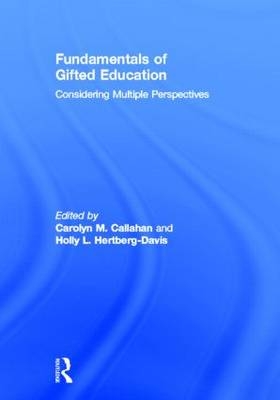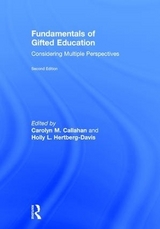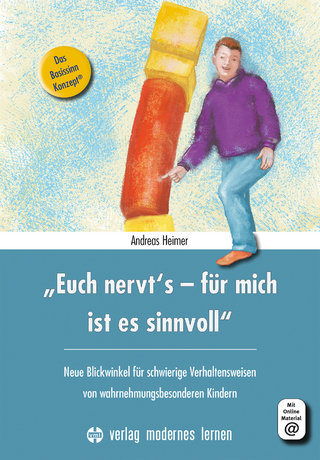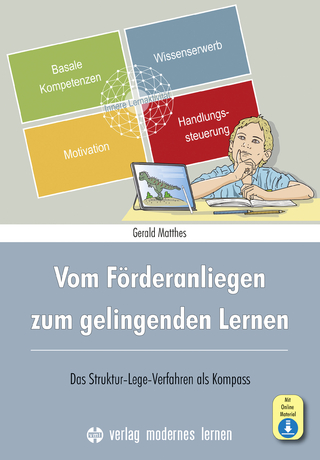
Fundamentals of Gifted Education
Routledge (Verlag)
978-0-415-88149-4 (ISBN)
- Titel erscheint in neuer Auflage
- Artikel merken
Distinguishing Features
Comprehensive Coverage – The book’s forty-five manageable-length chapters cover the full range of topics that must be considered in planning programs and services for gifted students both within and outside of school.
Coherent Structure – Section introductions provide background information and organizing questions to guide chapter authors who provide varying views of the issue at hand. The emphasis is not on the "right way" or the "wrong way" (except when clearly documented bad practice is discussed), but on how best practice stems from well-informed and logical decision-making.
Decision Making Focus – The book’s introductory chapter addresses the need for a clearly developed and consistently applied set of values to guide decision making. Likewise, each section introduction includes a decision making framework regarding some aspect of educating, counseling, or parenting gifted students.
This book is appropriate for introductory level courses in gifted education or courses in program development and planning. It is also suitable for school personnel responsible for making program planning decisions in the area of gifted education and for academic libraries with holdings in this area.
Carolyn Callahan (PhD University of Connecticut) is Commonwealth Professor of Education at the University of Virginia. She has been a principal investigator on projects of the National Research Center on the Gifted and Talented for the past 19 years. She has published more than 180 refereed articles and 50 book chapters across a broad range of topics on gifted education. She is a Past-President of The Association for the Gifted and the National Association for Gifted Children. She is currently Editor of Gifted Child Quarterly. Holly Hertberg Davis (PhD University of Virginia) is an educational consultant specializing in differentiation of instruction, advanced curriculum, and professional development. She is a former faculty member at the University of Virginia's Curry School of Education, where she taught courses in the education of the gifted and was a principal investigator for the National Research Center on the Gifted and Talented. She has written and presented extensively on her primary research interests: differentiation of instruction, staff development, and equity in Advanced Placement and International Baccalaureate courses.
1. Introduction Holly L. Hertberg-Davis & Carolyn M. Callahan Section I:
Beliefs, Philosophies, And Definitions Of Giftedness 2. Beliefs, Philosophies and Definitions Carolyn M. Callahan & Holly L. Hertberg-Davis 3. A Brief Synopsis of Events Influencing the Recognition and Education of Gifted Children in the United States
Kristofor Wiley & Marguerite Brunner 4. Policy-Related Definitions of Giftedness:
A Call for Change Jane Clarenbach & Rebecca D. Eckert 5. Gifted Behaviors vs. Gifted Individuals Joseph S. Renzulli & Marcia A. B. Delcourt 6. Being Gifted Erin Morris Miller 7. The DMGT 2.0: From Gifted Inputs to Talented Outputs Françoys Gagné 8. Problematizing Gifted Education James H. Borland Section II: Identification Of Giftedness 9. Considerations for Identification of Gifted and
Talented Students: An Introduction to Identification Carolyn M. Callahan, Joseph S. Renzulli, Marcia A. B. Delcourt & Holly L. Hertberg-Davis 10. Traditional Perspectives on Identification Susan K. Johnsen 11. The Use of Traditional Assessment Tools for Identifying Gifted Students Tracy C. Missett & Marguerite M. Brunner 12. Identifying Gifted Students: Nontraditional Uses of Traditional Measures David F. Lohman 13. Uses and Misuses of Matrices in Identifying Gifted Students: Considerations for Better Practice Tonya R. Moon 14. Identifying Gifted Learners: Nonverbal Assessment Frank C. Worrell 15. Not Just a Test: Utilizing Non-Test Assessments in Identifying Gifted and Talented Students Tonya R. Moon 16. RtI Approaches to Identification Practices within Gifted Education Mary Ruth Coleman Section III: Service Delivery Options And Programming Models For Gifted Students 17. Contexts for Instruction: An Introduction to Service Delivery Options and Programming Models in Gifted Education Holly L. Hertberg-Davis & Carolyn M. Callahan 18. Evidence Trumps Beliefs: Academic Acceleration is an Effective Intervention for High-ability Students Nicholas Colangelo, Susan Assouline & Maureen Marron 19. Cognitive and Affective Outcomes of Pull-out Programs: Knowns and Unknowns E. Jean Gubbins 20. Analyzing Pull-Out Programs: A Framework for
Planning Catherine M. Brighton & Kristofor Wiley 21. The Schoolwide Enrichment Model: A Focus on Student Creative Productivity, Strengths, and Interests Joseph S. Renzulli & Sally M. Reis 22. Cluster Grouping Programs and The Total School Cluster Grouping Model Marcia Gentry & C. Matthew Fugate 23. Levels of Service Model
Stephen T. Schroth 24. Parents and the Development and Education of Gifted Students Nancy M. Robinson 25. Effectiveness and Implications of Homeschooling for Gifted Students Lorie Hood Section IV: Curricular And Instructional Decisions 26. Defensible Curriculum for Gifted Students: An Introduction Holly L. Hertberg-Davis & Carolyn M. Callahan 27. The Multiple Menu Model: A Guide for Developing Differentiated Curriculum Joseph S. Renzulli 28. Depth and Complexity Sandra N. Kaplan 29. Differentiated Instruction Carol Ann Tomlinson 30. The CLEAR Curriculum Model Amy Azano 31. The Integrated Curriculum Model Joyce VanTassel-Baska Section V: Specific Populations 32. Heterogeneity Among the Gifted: Not an Oxymoron Carolyn M. Callahan & Holly L. Hertberg-Davis 33. Gifted Males: Understanding their Challenges and Honoring their Potential Thomas P. Hébert 34. Is This Really Still a Problem? The Special Needs of Gifted Girls and Women Sally M. Reis 35. Twice Exceptional Students: Gifted Students with Learning Disabilities M. Layne Kalbfleisch 36. Gifted Students with Emotional and Behavioral Disabilities Tracy Missett 37. Underachieving Gifted Students Del Siegle & D. Betsy McCoach 38. Gifted African Americans Frank C. Worrell 39. Asian American Gifted Students:
The Model Minority or the Misunderstood Minority? Sarah Oh & Carolyn M. Callahan 40. Gifted Latino Students: Overcoming Barriers and Realizing Promise Thomas P. Hébert 41. Students from Rural Environments Jonathan A. Plucker Section VI: Evaluation And Policy In Gifted Education 42. Evaluating, Reflecting, Affirming and Re-Directing: An Introduction to the Evaluation of Gifted Programs Carolyn M. Callahan & Holly L. Hertberg-Davis 43. Evaluating Services Offered to Gifted and Talented Students: A Planning Guide Carolyn M. Callahan 44. Assessing Resources, Activities and Outcomes of Programs for Gifted and Talented Tonya R. Moon 45. Political Issues in Gifted Education James J. Gallagher Recommended Readings By Topic
| Erscheint lt. Verlag | 6.8.2012 |
|---|---|
| Zusatzinfo | Following style Behavior Analysis for Effective Teaching; 19 Halftones, black and white; 20 Tables, black and white; 34 Illustrations, black and white |
| Verlagsort | London |
| Sprache | englisch |
| Maße | 178 x 254 mm |
| Gewicht | 1021 g |
| Themenwelt | Sozialwissenschaften ► Pädagogik ► Sonder-, Heil- und Förderpädagogik |
| ISBN-10 | 0-415-88149-8 / 0415881498 |
| ISBN-13 | 978-0-415-88149-4 / 9780415881494 |
| Zustand | Neuware |
| Informationen gemäß Produktsicherheitsverordnung (GPSR) | |
| Haben Sie eine Frage zum Produkt? |
aus dem Bereich



